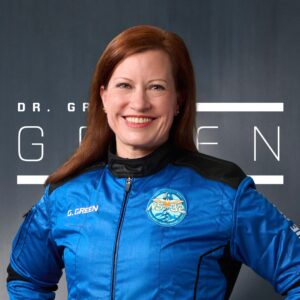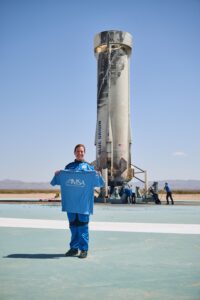
Even before she became a student at IMSA, Dr. Gretchen Green dreamed of space. Years later, she achieved it—becoming one of the rare few to see Earth from above. As a crew member on the NS-32 mission, she floated in zero gravity, traced the curve of the planet, and felt the profound clarity and gratitude astronauts often describe.
Her journey is more than a flight—it’s a testament to perseverance, preparation, and community. Just as she pursued her own dreams, Dr. Green has remained a steadfast supporter of IMSA, giving back so today’s students can also reach for the stars.
Her story shows that philanthropy isn’t just about funding programs; it’s about creating opportunities for future explorers, innovators, and leaders. For the IMSA community, her journey is a powerful reminder: no dream is too ambitious, and anything is possible.
- What inspired you to commit to this space trip? Did you always aspire to travel to space?
I chose space because, even at age 12, I knew it would be incredibly difficult to achieve—and that striving for it would require me to become my best self. That focus and perseverance defined me. While it became obvious early on that NASA wasn’t likely to be my path—unless they changed their vision requirements—I kept going. I reaffirmed the decision every day. I chose to live a more challenging life because I believed I’d be a better person for it, whether or not I ever made it to space. At IMSA, I was voted most likely to become an astronaut. I made no secret of my desire to go to space, and I’m really thankful that along the way I’ve been able to inspire other people to pursue their own dreams, and have now proven it’s possible.
Along the way, I stayed closely connected to the space community. I served as Chair of the Space Camp Alumni Board and now serve on the U.S. Space & Rocket Center Education Foundation Board. I immersed myself in those networks and built relationships over time. Ultimately, it was through one of those connections that I met the person who helped secure my ticket to space. Again, I’d tell anyone I met that my goal was to get to space. Ultimately, that’s what worked.
Even in this new era of commercial spaceflight, there are still so few seats that you can’t simply buy a ticket and go—there’s still a selection process. Being chosen for the NS-32 mission wasn’t random; it was the result of decades of quiet commitment, community, and showing up fully prepared when the opportunity finally arrived. You’ve got to be ready when the call comes.
- Can you describe the flight?
I expected the countdown to crawl by, since I’d waited so long for that moment—but to my surprise, time passed normally. I was filled with anticipation, wondering what it would feel like when the engine lit and we accelerated off the pad. It was almost an out-of-body experience—this surreal awareness that we were actually about to go to space, something I had imagined for most of my life.
When the rocket launched, it wasn’t as loud as I expected, but the acceleration was immediate and powerful. It felt like going up in a very fast elevator in a skyscraper—surprisingly smooth. As we climbed, I watched the sky shift from blue to deep black—and that’s when it really hit me: this wasn’t like taking off in an airplane. We were leaving Earth behind. Then, suddenly, the engines cut off and I was floating—weightless. I did a flip, looked out the window, and saw the curve of our planet below. It was beautiful beyond words. Though the flight lasted just over 11 minutes, it was profoundly immersive. In those few minutes, I felt awe, clarity, and deep gratitude.
And I also felt something I hadn’t fully expected: a sense of completion and confirmation—that I was exactly where I should be. Everything I had done in my life added up to being in space. We had practiced so many different ways things could go wrong during the flight, and every second that proceeded like clockwork felt like perfection.
- Were there any profound moments you experienced, perhaps when you saw the Earth from space or upon landing? Did anything change about your perception of Earth or humanity seeing the world from that vantage point?
When we reached space, the capsule became completely quiet. We all turned to the windows, and from my vantage point, the Earth was entirely cloud-covered. What I saw were three distinct layers: the blackness of space, the thin blue line of atmosphere, and the soft, white curve of the cloud-covered Earth. The funny thing is—it looked exactly like I expected it to, based on all the photos and movies I’d seen over the years. That part wasn’t surprising.
But the feeling was. I was filled with a sense of completion—like everything I had worked toward had converged in that moment. I was meant to be there. And then something unexpected happened: I turned away from the window. I felt compelled to look back at my crewmates, to watch them experiencing it. We cheered each other on, especially when we crossed the Kármán line—62 miles above Earth—the international boundary of space. At that moment, one of my crewmates became the first person in history to visit all 193 countries, reach both the North and South Poles, and then go to space. We all cheered for him because we got to experience that moment of achievement for him, too. The connection between us was just as powerful as the view outside.
Our crew was called the Pathfinders because each of us had found a different route to space—but with common themes of exploration, entrepreneurship, and purpose. Throughout training, our flight, and afterward, I think we all felt incredible gratitude for what we were experiencing. There was a true awareness that this wasn’t just a personal milestone—it was a gift. One we were meant to share with others.

- Was there anything about your time at IMSA that helped pave the way for you to make this trip, either through your career or mindset? What advice would you give to current students who might have ambitions to follow in your footsteps?
IMSA gave me the space to dream big and the tools to make them happen. It was a surprisingly diverse learning environment where I focused just as much on history and other humanities as I did on math and science. I loved how IMSA created an environment where everyone was pursuing many dreams. It was normal—and encouraged—to be ambitious, to feel limitless, and to explore new ideas. I could have become a singer, historian, or maybe a flight attendant with all the languages I took. I later earned a masters degree in the history of medicine, based on my National History Day contest entries, and served on the National Women’s History Museum Board – thank you, Dr. Guest and Mr. Hollister! I sang opera until my thirties when medical practice took too much evening time to commit to more rehearsals – thank you, Mrs. Bach! And French came in very handy during a trip on a polar class 2 icebreaker ship where almost everyone spoke French – thank you, Mme Shultz! And I thought a lot about spirituality and what Joseph Campbell or Reinhold Neibuhr might think of my journey to space (thank you, Mr. Casey!). Dr. Workman, I may not have been the strongest physics student, but I learned enough to know exactly how momentum influenced my zero-gravity maneuvers!
One of the wonderful parts about all my teachers at IMSA was that it felt like every one of them believed I could do what I said I wanted to do. Having people who can help identify different strengths is so important.
To current students: whatever dream you have, take it seriously—even if no one else around you does yet. Find teachers who get to know you. You don’t have to know every step right now. Just start. Follow your curiosity. Take on challenges that stretch you. And keep showing up, even when the path is unclear. You’ll know you chose the right path when you reach the destination and look back, but you won’t be able to predict exactly how you’ll get there along the way.
- Were there any surprises you didn’t expect that you experienced on your trip?
Yes—some of the biggest surprises were actually how familiar it all felt. I didn’t expect the view out the window to seem so known. I was aware that other astronauts have described a range of emotional reactions: some have felt fear staring into the void of space; others have felt the Earth’s fragility seeing how thin the atmosphere really is; many have commented on the absence of borders and the sense of shared humanity. But for me, after seeing so many images and films of space, it looked exactly as I expected it to. That wasn’t the surprise.
The surprise was how normal it all felt. In the weeks leading up to the flight, it felt so unreal—like it couldn’t possibly be happening. “Unbelievable” was the word that kept running through my mind. But once we launched, everything made sense. It was deeply familiar—like I’d been there before. A lot of people describe space as a foreign or disorienting environment, completely unlike Earth. But for me, it was kind of the opposite. I felt like I had come home when I reached space. That feeling of calm, clarity, and readiness—of being exactly where I was supposed to be—was unexpected and profound.
A lot of that had to do with my early training. Everything I did as a Space Camp camper and crew trainer came flooding back. I had trained high school students to fly simulated shuttle missions, and now I was flying for real. Even the leadership role felt natural. As a physician, I’m used to responsibility and calm under pressure. Having served in the role of Commander on so many missions at Space Camp, I had rehearsed this in ways I didn’t fully appreciate until I was actually there.
I was concerned when I returned that I would lose the feeling I had while in space. But instead, I haven’t really felt like the journey has ended. I still feel like I’m up there in some way—carrying that sense of completion and perfection with me. Rather than feeling mundane, the things I do every day—like checking the mail or making food—feel like such a pleasure. Because the rest of my life is a bonus.
Now, I get to spend this next chapter helping inspire others to achieve their highest purpose and to benefit from my experience. I truly want to serve as a living example that you can take what seems like an impossible dream and make it a reality. It’s really hard—and that’s exactly what makes you your best version of yourself.